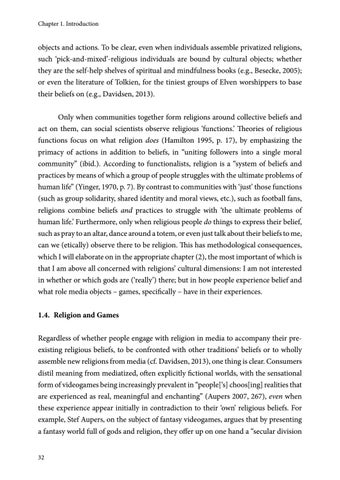Chapter 1. Introduction
objects and actions. To be clear, even when individuals assemble privatized religions, such ‘pick-and-mixed’-religious individuals are bound by cultural objects; whether they are the self-help shelves of spiritual and mindfulness books (e.g., Besecke, 2005); or even the literature of Tolkien, for the tiniest groups of Elven worshippers to base their beliefs on (e.g., Davidsen, 2013). Only when communities together form religions around collective beliefs and act on them, can social scientists observe religious ‘functions.’ Theories of religious functions focus on what religion does (Hamilton 1995, p. 17), by emphasizing the primacy of actions in addition to beliefs, in “uniting followers into a single moral community” (ibid.). According to functionalists, religion is a “system of beliefs and practices by means of which a group of people struggles with the ultimate problems of human life” (Yinger, 1970, p. 7). By contrast to communities with ‘just’ those functions (such as group solidarity, shared identity and moral views, etc.), such as football fans, religions combine beliefs and practices to struggle with ‘the ultimate problems of human life.’ Furthermore, only when religious people do things to express their belief, such as pray to an altar, dance around a totem, or even just talk about their beliefs to me, can we (etically) observe there to be religion. This has methodological consequences, which I will elaborate on in the appropriate chapter (2), the most important of which is that I am above all concerned with religions’ cultural dimensions: I am not interested in whether or which gods are (‘really’) there; but in how people experience belief and what role media objects – games, specifically – have in their experiences. 1.4. Religion and Games Regardless of whether people engage with religion in media to accompany their preexisting religious beliefs, to be confronted with other traditions’ beliefs or to wholly assemble new religions from media (cf. Davidsen, 2013), one thing is clear. Consumers distil meaning from mediatized, often explicitly fictional worlds, with the sensational form of videogames being increasingly prevalent in “people[‘s] choos[ing] realities that are experienced as real, meaningful and enchanting” (Aupers 2007, 267), even when these experience appear initially in contradiction to their ‘own’ religious beliefs. For example, Stef Aupers, on the subject of fantasy videogames, argues that by presenting a fantasy world full of gods and religion, they offer up on one hand a “secular division 32
